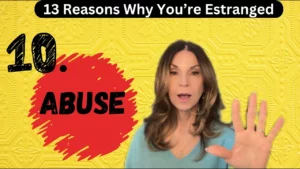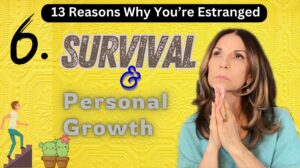Witnessing a loved one have a mental illness or addiction can be heart-wrenching, especially when that person is your child. The pain deepens when their struggles lead to estrangement, creating a chasm in the parent-child relationship. In this blog post, we’ll explore the intricate interplay between mental health, addiction, and estrangement, shedding light on the challenges faced by families and offering a beacon of hope for those navigating these turbulent waters.
Welcome back to our ongoing exploration of the 13 factors contributing to family estrangement. If you’re joining us, we encourage you to familiarize yourself with our previous blog posts and watch the initial 8 blogs and videos of the series. Doing so will provide valuable context and enhance your comprehension of the subjects we’ve addressed thus far, enabling you to engage fully in the upcoming discussions.
Mental Illness and Addiction:
The Complex Dance of Mental Health and Addiction delves into the intricate relationship between psychological well-being and substance misuse. Mental health encompasses a broad spectrum of conditions, from common disorders like depression and anxiety to more severe diagnoses such as bipolar disorder and personality disorders. These conditions affect individuals worldwide, cutting across demographic boundaries and impacting people from all walks of life.
Similarly, addiction, classified as a mental illness in the DSM-5, exerts a formidable hold on those it affects. Whether it’s substance abuse or behavioral addictions, such as gambling or compulsive shopping, addiction can hijack the brain’s reward system, leading to compulsive behaviors despite adverse consequences.
The intertwining of mental health and addiction creates a complex web of challenges, particularly within familial relationships. As mental health issues or addiction take hold, trust between family members may erode as behaviors become unpredictable and communication becomes strained. Loved ones may feel helpless or powerless in the face of their family member’s struggles, leading to frustration, resentment, or even isolation.
In many cases, the presence of mental health issues or addiction can exacerbate existing tensions within families, leading to fractures in relationships. Coping with these challenges may push family members apart, resulting in estrangement or distancing.
Trust, a cornerstone of healthy relationships, is often one of the first casualties when mental health issues or addiction enters the picture. As individuals grapple with internal battles, they may become unreliable or unpredictable, causing loved ones to question their motives or intentions. This breakdown in trust can further fuel feelings of isolation and alienation, exacerbating the rifts within families.
Communication breakdowns are another common consequence of the complex dance between mental health and addiction. As individuals struggle to articulate their feelings or experiences, misunderstandings can arise, leading to conflicts or resentment. Moreover, the stigma surrounding mental health and addiction may discourage open dialogue within families, perpetuating feelings of shame or secrecy.
Ultimately, the intertwining of mental health and addiction creates a challenging environment for families to navigate. As trust erodes, communication falters, and relationships fracture under the weight of illness, loved ones may find themselves grappling with feelings of grief, frustration, and helplessness. However, with understanding, support, and professional guidance, families can begin to untangle the complexities of mental health and addiction, forging pathways toward healing and reconciliation.
The Impact on Parent-Child Relationships:
When either a parent or an adult child grapples with mental illness or addiction, the reverberations are felt throughout their relationship. Simple tasks become Herculean feats, and behaviors may push loved ones away, leaving both parties with guilt, inadequacy, abandonment, and betrayal. The once-strong bond between parent and child may falter, leading to estrangement and profound sorrow.
Navigating the Blame Game:
The question of blame looms large in the landscape of mental illness and estrangement. While some parents may bear responsibility for contributing to their child’s suffering through negligence or abuse, it’s crucial to recognize the complexity of familial dynamics and individual experiences. Blame can deepen the divide between parents and adult children, hindering the path to reconciliation and healing.
The Stigma of Addiction:
Addiction further complicates the dynamics of estrangement as families grapple with communication breakdowns, dishonesty, and fear for their loved one’s well-being. Setting firm boundaries becomes essential for preserving one’s own mental and emotional health while offering support to the addicted individual. Rebuilding relationships amid addiction requires resilience, self-care, and unwavering support from understanding allies.
Steps Towards Healing and Reconciliation:
Despite the challenges posed by mental illness, addiction, and estrangement, there is hope. By setting clear boundaries, educating ourselves about mental health, prioritizing self-care, and seeking support from others, we can navigate the complexities of family relationships with compassion and resilience. Professional guidance and support groups can offer invaluable resources for those traversing this rugged terrain.
In the face of mental illness, addiction, and estrangement, hope shines bright. Families can find their way back to each other through love, understanding, and mutual support, forging stronger bonds and brighter futures. Let us tread this path with empathy and determination, knowing that healing and reconciliation are within reach for those who dare to journey towards them.









